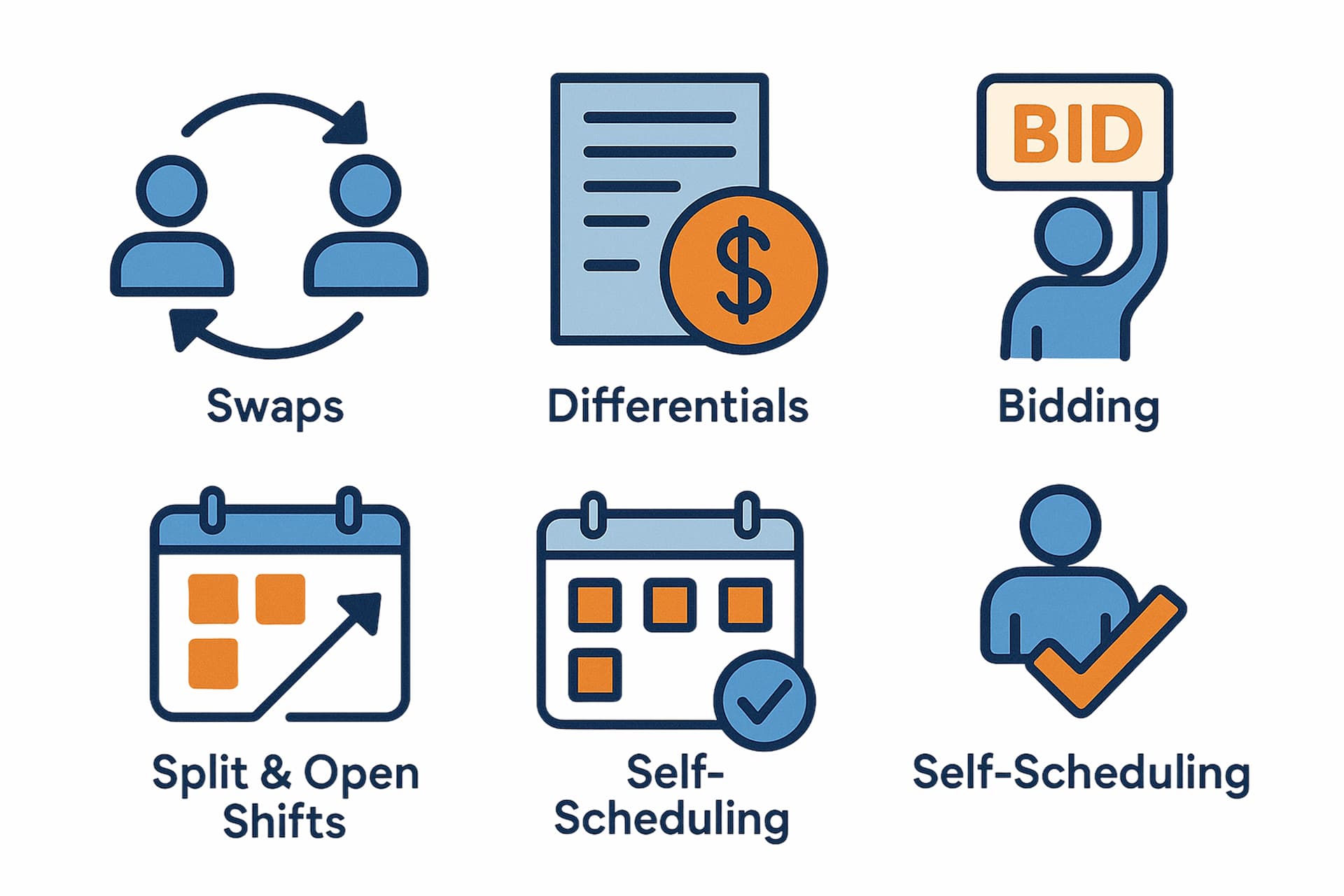Minimum Wage
Minimum wage is the lowest hourly rate employers are legally required to pay under federal law. The Fair Labor Standards Act (FLSA) sets the federal baseline; states and cities may require more.
Federal rate. The federal minimum wage is $7.25/hour for most covered, nonexempt employees (unchanged since 2009).
Coverage. The FLSA generally covers employers engaged in interstate commerce or with at least $500,000 in annual sales, as well as hospitals, schools, and government entities.
Subminimum programs. Limited federal programs allow rates below $7.25 in specific cases (e.g., youth minimum wage, full-time student certificates, and Section 14(c) certificates for workers with disabilities), subject to strict rules and documentation.
Highest rate applies. When federal, state, or local rates differ, employees must be paid the highest applicable minimum wage.
Tipped Minimum Wage
The FLSA permits a lower direct cash wage for eligible tipped employees, if combined tips + cash wage reach the full federal minimum wage.
Federal tipped cash wage. $2.13/hour is the federal direct cash wage for tipped employees, with a tip credit allowing employers to count tips toward meeting the $7.25 minimum (subject to state limits).
Make-whole rule. If tips plus cash wage do not reach $7.25/hour in a workweek, employers must make up the difference.
Tip ownership and pooling. Tips belong to employees. Tip pools may be allowed, but managers and supervisors cannot keep employees’ tips.
Service charges. Mandatory service charges are not tips; they are employer revenue and must be treated accordingly on payroll.
Overtime Laws
The FLSA requires covered employers to pay nonexempt employees at least 1.5× their regular rate for all hours worked over 40 in a workweek.
Standard rule. Overtime is due for hours over 40 in a workweek at no less than time-and-a-half of the regular rate.
Regular rate. Must include nondiscretionary bonuses, commissions, shift differentials, and certain incentives.
Exemptions. Some employees are exempt (e.g., bona fide executive, administrative, professional, certain computer employees, outside sales, and certain highly compensated employees) if they meet duties and salary tests.
Recordkeeping. Employers must keep accurate time and pay records for nonexempt employees.
Meal and Rest Breaks
The FLSA does not require employers to provide meal or rest breaks. However, when short breaks are offered, federal rules determine whether they are paid.
Short breaks. Breaks of about 5–20 minutes are generally counted as hours worked and are paid.
Bona fide meal periods. Typically 30 minutes or more during which the employee is completely relieved of duties; these are not hours worked and are unpaid.
State laws may differ. Many states impose separate break requirements; employers must comply with the most protective rule applicable.
Leave and Holidays
Federal law does not require private employers to offer paid vacation, paid holidays, or paid sick leave. The Family and Medical Leave Act (FMLA) provides unpaid, job-protected leave for eligible employees.
Vacation and holidays. The FLSA does not require paid or unpaid vacation or holiday leave. Employer-provided benefits are governed by company policy or contract, subject to other applicable laws.
Sick leave. There is no general federal requirement for paid sick leave for private employers (separate rules may apply to certain federal contractors).
FMLA overview. Employers with 50+ employees must provide eligible employees up to 12 weeks of unpaid, job-protected leave in a 12-month period for qualifying reasons (e.g., serious health condition, bonding with a new child, certain military-related needs). Up to 26 weeks for military caregiver leave.
FMLA eligibility. Employee must have worked for the employer for at least 12 months, at least 1,250 hours in the prior 12 months, and at or within 75 miles of a worksite where the employer has 50+ employees.
Benefits and job protection. During FMLA leave, group health benefits must be maintained; upon return, employees are restored to the same or an equivalent position.
Child Labor Laws
The FLSA’s youth employment rules restrict the occupations and hours that minors may work to protect their health and educational opportunities.
Under 14. Only limited jobs are permitted (e.g., casual babysitting, acting, newspaper delivery, home-based evergreen wreath work, or work for a parent’s non-hazardous business).
Ages 14–15 (non-manufacturing, non-hazardous). Outside school hours only; generally up to 3 hours on a school day / 18 hours in a school week; up to 8 hours on a non-school day / 40 hours in a non-school week; not before 7 AM or after 7 PM (extended to 9 PM June 1–Labor Day).
Ages 16–17. May work unlimited hours in non-hazardous jobs; hazardous occupations are prohibited until 18.
Youth minimum wage. Employees under 20 may be paid $4.25/hour during their first consecutive 90 calendar days of employment (other limits apply).
Agricultural and entertainment. Separate federal rules apply; state law may also impose additional limits.
Hiring and Firing
Federal law provides baseline protections that apply to hiring, background checks, nondiscrimination, and termination. Employment “at-will” is primarily a matter of state law, but federal laws prohibit discriminatory or retaliatory actions.
Nondiscrimination. Employers may not discriminate based on protected characteristics under federal law (e.g., race, color, religion, sex including pregnancy and LGBTQ+ status, national origin, age 40+, disability, genetic information). Retaliation for protected activity is also prohibited.
Background checks (FCRA). Consumer reports require advance disclosure and written authorization; employers must follow pre-adverse and adverse action steps if taking action based on a report.
Fair chance for federal jobs. The Fair Chance to Compete for Jobs Act limits criminal history inquiries for federal agencies and contractors until after a conditional job offer (private employers follow state/local rules).
NLRA rights. Most private-sector employees have the right to organize, form/join a union, and engage in protected concerted activity regarding working conditions.
At-will caveat. Many employment relationships are at-will under state law, but federal laws still bar discrimination, retaliation, and other unlawful reasons for termination.
Disclaimer:
The information provided is for general informational purposes only and is not legal advice. Always confirm requirements with official federal and applicable state/local sources. Shifts by Everhour helps automate compliance but does not replace legal or payroll consultation.
Official Resources
- U.S. Department of Labor — Wage and Hour Division (WHD)
- FLSA: Minimum Wage, Overtime, Recordkeeping
- Family and Medical Leave Act (FMLA)
- Occupational Safety and Health Administration (OSHA)
- Equal Employment Opportunity Commission (EEOC)
- National Labor Relations Board (NLRB)
- CFPB — Fair Credit Reporting (FCRA)



